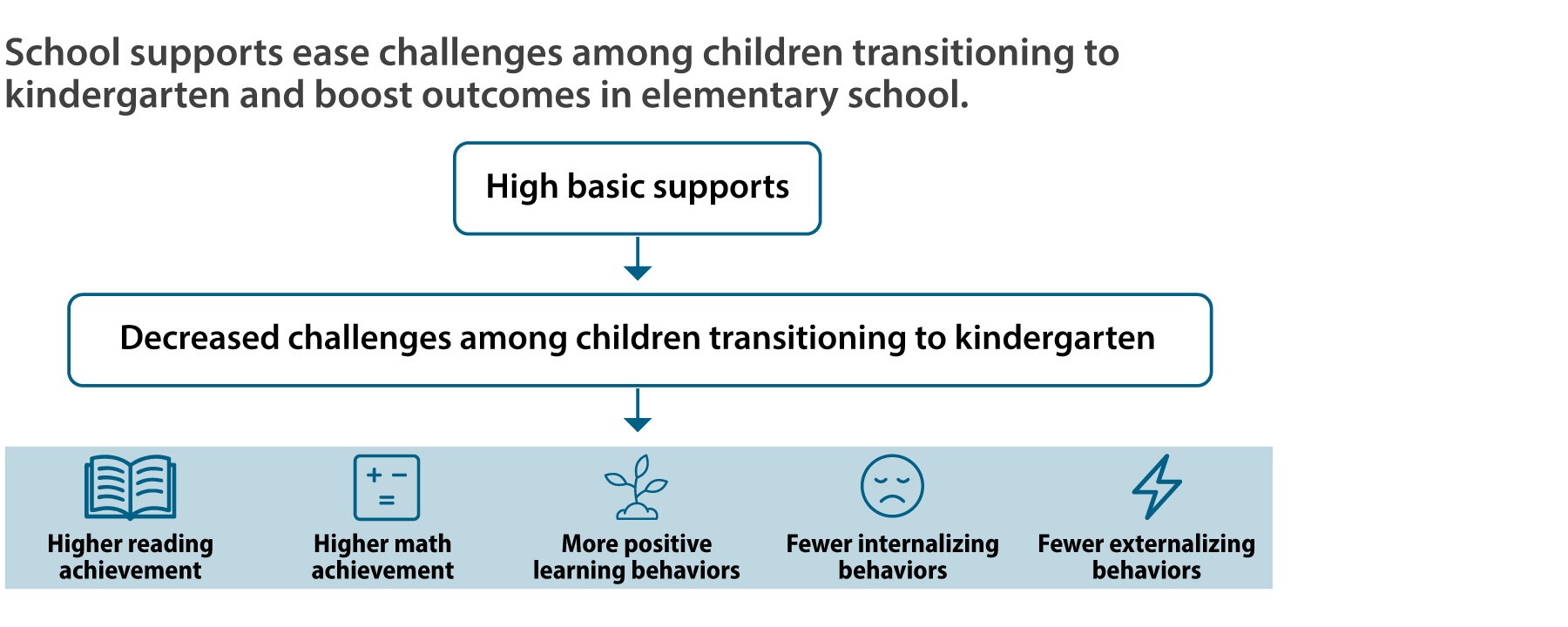Supporting children transitioning to kindergarten
Schools’ Supports Ease Challenges During Transition to Kindergarten and Improve Children’s Academic Achievement and Well-Being through Elementary School
Briana A. López, Aprile D. Benner
Key Findings
-
Supports for transitioning to kindergarten clustered in three patterns across elementary schools: minimal, high basic, and intensive.
-
Challenges associated with transitioning to kindergarten harmed children’s academic achievement and socioemotional well-being through elementary school.
-
Attending schools that offered a high level of basic supports reduced challenges during the transition and promoted children’s academic success and well-being in elementary school.
Transition support activities among elementary schools fell into three patterns. Most elementary schools (63%) were considered high basic and offered many basic supports, including sending information home to parents, offering parent orientation, and allowing children to visit the kindergarten classroom before beginning kindergarten. Twenty-nine percent of schools offered similar basic supports such as sending information home but at a lower frequency than high basic schools. These schools were considered to offer minimal supports. Nine percent of schools, considered intensive, offered many basic supports as well as supports requiring more effort and resources such as home visits, a shortened school day, or staggered school entry.
Challenges associated with transitioning to kindergarten harmed children’s academic achievement and well-being. Children who struggled most psychologically with transitioning to kindergarten performed worse in reading and math and showed more internalizing behaviors (withdrawal, anxiety) and externalizing behaviors (fighting, anger). Negative effects persisted into fifth grade, especially for math achievement, internalizing behaviors, and student’s learning behaviors (pays attention well, works independently).
High levels of basic supports were most effective in easing the adjustment to kindergarten and reducing challenges. In turn, fewer challenges led to higher academic achievement and greater well-being among children. Children attending schools which prioritized high levels of basic supports, such as sharing information and hosting orientations with parents, experienced fewer challenges during the transition. These decreased challenges at the transition were tied to stronger learning behaviors, fewer internalizing and externalizing behaviors, and greater academic success (see figure). Children did not thrive more in schools which offered intensive supports such as home visits.
Policy implications
Findings from this study suggest a need for structured support to reduce challenges among young children during their transition to kindergarten. Accessible and low-cost strategies, like building stronger pipelines between pre-K and kindergarten, work well. These strategies include clear consistent communication with parents, increased parent-teacher interaction, and classroom visits. Policy frameworks should establish uniform standards and incentivize the widespread adoption of these basic transition supports, which have the potential for long-term returns in child well-being and academic achievement.
Data and Methods
The authors analyzed a sample of 13,390 children from kindergarten through fifth grade. The data came from the National Center for Education Statistics’ Early Childhood Longitudinal Study-Kindergarten 2011 Cohort. It is a nationally representative sample of American children followed from kindergarten (2011-2012) to fifth grade (2015-2016). Measures included transition challenges (complain about school, upset/reluctant to go to school, fake sick), transition supports (send home information to parents, preschooler visit to kindergarten classroom, shortened school day, parents and children visit kindergarten classroom, home-visit, orientation, and staggered school entry), students’ learning behaviors (paying attention, working independently), academic achievement, socioemotional well-being (internalizing and externalizing behaviors) and control variables for children (age, gender, race/ethnicity, socioeconomic status), geography (U.S. region, rural/urban), and schools (private/public). To examine the immediate and sustained associations between transition challenges and children’s academic and socioemotional outcomes, the authors conducted path analyses in a structural equation modeling framework.
Reference
[1] López, B., & Benner, A.D. (2025) Challenges in the transition to kindergarten and children’s well-being through elementary school: Do school transition supports matter? Early Childhood Research Quarterly 71. https://doi.org/10.1016/j.ecresq.2025.01.001
Suggested Citation
López, B., & Benner, A.D. (2025). Schools’ supports ease challenges during transition to kindergarten and improve children’s academic achievement and well-being through elementary school. Population Research Center Research Brief 10(8). https://doi.org/10.26153/tsw/61103
About the Authors
Briana López, brianalopez@utexas.edu, is a Population Research Center graduate research trainee at The University of Texas at Austin; Aprile D. Benner is a professor in the Department of Human Development and Family Sciences and a faculty scholar at the Population Research Center, UT Austin.
Acknowledgements
This work was supported by grant P2CHD042849 and the grant, T32HD007081, Training Program in Population Studies, awarded to the Population Research Center at The University of Texas at Austin from the Eunice Kennedy Shriver National Institute of Child Health and Human Development. The content is solely the responsibility of the authors and does not necessarily represent the official views of the National Institutes of Health or other funders.

